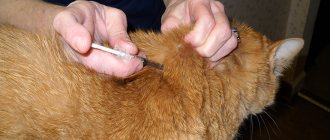Babysitter for a cat
Personal space is important to cats, and changes in the environment make the animal feel anxious. Therefore, the easiest option is to ask someone to come see your pet. An acquaintance or relative can become such a “nanny” for a cat during the holidays. If you can't find the right person, try finding someone who will take care of your cat for a small fee.
Before departure you need:
- Take care of nutrition and buy food in advance. Explain to the “nanny” how to feed the cat: how many times a day and how much food to give, how often to pour fresh water;
- Explain how and when to clean the litter box. Check to see if you are running out of cat litter;
- Exchange phone numbers with the person who will look after the cat.
If your cat has a hard time being alone, such communication will not be enough for him. Then it is worth considering the option of temporary relocation.
Within our own walls
This is perhaps a more gentle option for the cat than keeping it in another room during the holidays. The animal remains in its own apartment, and you hire a well-known neighbor or a “cat nanny” (there is such a service), who will visit your pussy twice a day, feed, clean the litter box and spend some time communicating with it.
The only absolutely necessary requirement is the reliability of the person you trust to look after your cat. If in all the above options the presence of people near the animal is guaranteed, then in this case the “forgetfulness” of the temporary owner can lead to serious, or even irreparable, consequences.
The “cat nanny” must introduce you to a person who can always replace her in the event of an unexpected illness or other circumstances.
Larisa Solodovnikova
Moving a cat to friends or relatives
This option is suitable for those cats who have difficulty withstanding loneliness. Any move, even for a short time, is stressful, so the cat will be more comfortable with familiar people. Choose a candidate from people with whom the pet is willing to make contact.
Familiar toys, a scratching post and a house will help reduce your cat’s anxiety. Don't forget to buy food, bring bowls and a tray. When choosing a temporary family, pay attention to the conditions in the apartment and the composition of the family. You should not place your cat in a home with children or an aggressive dog.
Alternative options
If your own apartment is not suitable for some reason, then there are several other options where you can leave your cat during your vacation. The most comfortable of them is the one that involves living with a familiar person. Despite this, other options are also acceptable, since they all provide for regular feeding and safety.
Give the cat to relatives or friends for a while
The main disadvantage of such a solution is the possible presence of other pets at the receiving party. Once on foreign territory, the cat will experience severe stress, and additional aggression from the four-legged owner will aggravate the situation.
It is better to introduce pets in advance on the cat’s territory. If the acquaintance went smoothly, then you don’t have to worry. If the future neighbor is aggressive even on someone else’s territory, then the animals will have to be kept in different rooms.
When choosing from possible candidates, give preference to the main favorite of your pet who loves cats. This will prevent mistreatment and reduce the stress of temporary relocation. Be sure to give your cat's personal belongings to your relatives or friends. A familiar smell will help him calm down faster in new conditions.
Another option is for someone to live in your apartment with the animal or to periodically spend the night here. For many cats, this is enough to feel comfortable.
Give the cat to a zookeeper or for foster care
A pet sitter is a person who cares for pets in their own apartment while their owners are away for a fee. You can find a pet sitter through a large company or private advertisements.
In the first case, the cost of overexposure will be higher, but you can be sure of the safety of your pet.
When meeting, make sure that you have your veterinary passport checked. This will reduce the risk of transmission of infection from other guests. Some pet sitters agree to send daily photo or video reports, but this method of information is not very reliable.
The main disadvantage of a pet sitter is the high probability of keeping several pets at the same time. This is fraught with conflicts and infection, so agree in advance that such an action is impossible or contact a pet hotel.
Hotel for pets
A pet hotel is a more reliable option than a pet sitter. Guests with mustaches are guaranteed veterinary care, so there is no need to worry about their health. All cats are kept in separate boxes or enclosures and are checked for mandatory vaccination. This eliminates territorial conflicts and contamination.
Owners can watch their mustachioed guests online via web cameras installed in each box or enclosure. Thanks to the video surveillance system, you can check the correctness of feeding and the condition of your pet.
All premises undergo mandatory disinfection, and a contract is concluded with each owner. Despite this, be sure to read reviews of each pet hotel you like. There are scammers in every field. Beautiful pictures on the site are not an indicator of comfortable conditions. Before giving your pet away, check its future place of residence for cleanliness and spaciousness.
Shelter or volunteer help
Volunteers working in shelters care for homeless and abandoned animals. Their main goal is to place the “foundlings” in good hands. They can only be contacted in case of force majeure: emergency hospitalization or other urgent circumstances.
If you live in a foreign city without relatives and friends, and are also experiencing problems with money, then turning to a shelter is the only possible solution. However, do not forget that it is temporary. Cat shelters are always overcrowded, and the living conditions of the animals leave much to be desired. Try to get your cat home as soon as possible.
Paid foster care or hotel for cats
In special hotels, pets are fed, bathed, and taken for walks until their owner returns. This method will be more expensive, but it has a number of advantages:
- Specialists will take care of the cat. They will be responsible for the pet;
- At the hotel, animals are kept separately in a specially designed room. The pet will not be harmed: it will not run away, will not fall out of the window and will not eat a poisonous plant;
- If an animal is sick, it will receive immediate medical attention;
- The hotel staff will professionally take care of animals with specific needs. They will provide the necessary care and treatment;
- Possibility of 24/7 monitoring of your cat via webcam.
Visit the hotel before leaving your cat there and pay attention to the size and cleanliness of the cages, and the order in the premises. The smell of urine and fur in the premises are sure signs that the animal is in danger here. If your cat is going to walk in the yard, inspect the area. The pet can escape if it finds a gap or hole.
Leave your cat at a hotel on holiday?
Zoo hotels are private small businesses that are registered. However, to open such an enterprise, you do not need to obtain a license, so, in fact, any person can be its owner, including those without special education, experience, or even love for animals. Therefore, before you give your cat to a pet hotel, you should not only collect as many reviews about it as possible, but also be sure to visit there in person.
Ideally
For clarity, let’s draw a picture of an ideal pet hotel. So, you come to a building located away from residential buildings, surrounded by a fence, with a mandatory security point. The reception time for visitors wishing to get acquainted with the living conditions is strictly specified and the hotel does not resemble a passage yard.
The premises for cats are located separately from the premises for dogs, preferably even with a separate entrance, so that barking guests, going for a walk, do not disturb the meowing guests. The enclosures themselves are free, no more than 2–3 in one room. A separate exit should lead to a fenced area for walking.
There is no specific smell in the premises, cleanliness and order reign everywhere, the air is warm and not humid, the floors are tiled, linoleum, and other easy-to-clean coverings. When talking with you, the staff politely and thoroughly answers all your “stupid” questions, asked in numbers that can drive even an angel out of patience.
The hotel provides feeding with the brand of food you specified or with a natural diet according to the menu you have detailed. Medical procedures are negotiated and paid for separately, as well as ear cleaning, nail trimming and combing of the long-haired beauty.
How is it going?
So, the decision has been made. On the agreed day, you bring your cat to the pet hotel. Take with you a veterinary passport with vaccination records, as well as your cat’s personal bedding and toys to make it easier for her to endure separation from home.
The staff veterinarian of the pet hotel gets acquainted with the veterinary passport and examines your cat, about which a special note is made in the animal acceptance certificate.
Next, an agreement is concluded with you - a document that has legal force. It details the obligations of the parties and their responsibilities in the event of a breach of obligation. The contract specifies a phone number by which you can find out how your pussy is doing at any time, regardless of time zones and roaming costs.
Is it possible to leave a cat alone?
A cat, especially in summer, needs fresh food and water every day and frequent cleaning of the litter box. Therefore, it is not recommended to leave your pet alone, even if it is for a week. In case of injury, there will be no one to help.
Sometimes it happens that there is no other way out. To ensure your cat's comfort, pay attention to the following things:
- Feed. Opened canned food is stored for no more than a day, so the cat can be alone in the apartment only if it eats dry food. An automatic feeder will be a good helper: fill it with plenty;
- Water. Install a drinker. A special fountain is also suitable for these purposes. Also leave water in the rooms. Do not use plastic bowls: the water in such dishes quickly becomes dirty and evaporates. You can place a deep plate in the sink and turn on the tap. Clear the sink of foreign objects: the cat will drop them and block the drain;
- Tray. Add extra trays and more litter than usual. Secure the door to the toilet, otherwise the cat may slam it;
- Cat safety. Do not leave the windows open, but there should be fresh air in the apartment - make a minimal gap. Close cabinets and cabinets and make sure that the cat does not get to dangerous objects: threads, first aid kits, household chemicals, bags.
Of course, it is safer not to leave your cat alone during your vacation.
It is better to try to find a friend who will live with the pet owner in the apartment. This way, the cat will be looked after, and your pet will not get bored during your absence. Did you like the article? Share with your friends!
Looking for outside help
One of the most accessible options is to contact the people who live in your neighborhood. Naturally, the temporary guardian must be an adult who loves animals. You should not contact parents with many children, as your pet may become a toy for children. In addition, young parents are already constantly overloaded; someone else’s animal will clearly be their priority. If you are leaving your cat as a guest, it is worth refusing to have guardians of retirement age, as the cat may become frightened and run away. It will be difficult for older people to look for a pet.
Make sure the temporary caregiver is committed to keeping the pet comfortable. You can understand how serious the intentions are in relation to the preparatory procedures. It will be very good if the caretaker has experience in interacting with or keeping cats. By the way, it is extremely undesirable to leave your pet at a place where cats or dogs already live . Before leaving, exchange all contact details so that the guardian can contact you at any time of the day or night.
Paid foster care
Overexposure is something between a pet hotel and a home-type shelter. Animals are not in cages or enclosures; they move freely around the house and communicate with their guardian. The disadvantage of such overexposure is in a large number of animals, but the advantage is active communication (if this is important for the cat).
It doesn’t matter how long you leave the animal, for three days or a week, the owner of the foster home must ask you for a veterinary passport. Vaccinations must be completed at least 3 weeks before handing over the animal. If this moment is missed, look for another foster care! There are quite a lot of virus carriers among cats, especially those that were once street cats. If your cat is not required to have vaccinations, then the health of other animals should be questioned.
There are 2 options for feeding:
• You leave food for the cat. • All animals are fed the same - not suitable for animals with sensitive digestion or food allergies.
Advice: Be sure to visit the paid foster care facility before departure and preferably several times!
A very important point is the location of the tray and its cleanliness. Subjectively, this is the biggest problem with paid overexposures. Many owners, after vacation, are faced with the fact that their pet begins to crap in the house. A newcomer who finds himself with already settled cats may tolerate infringements of the territorial plan, that is, other cats will go to his litter box. Find out in detail how exactly these issues are regulated in foster care.
Important! The animal is transferred to paid foster care after concluding a legally valid contract for the provision of services.
Zoonanny
More expensive and higher quality service. Your pet will not be picked up by a pet sitter, provided that there are no more animals in the house. This option is similar to the above (leave the cat as a guest) with only one difference - the pet sitter receives a pre-agreed remuneration for her work.
Your task is to visit the pet sitter’s house and find out a number of questions:
- How long the guardian is absent from home.
- How long has the caregiver been providing such services?
- What household chemicals are used to treat the home before a new guest moves in?
- Does the guardian want to feed the cat natural food if necessary?
- Does the pet sitter require vaccinations for animals?
Advice! Be sure to find out whether the guardian has primary veterinary care skills and how much such services cost.
Hotel
The hotel is a boarding-type shelter for animals . On the one hand, this option is the most reliable, on the other hand, it is very doubtful. Let's start with the pros:
- Hotels for animals are opened by knowledgeable people with extensive experience in keeping animals.
- The animal is transferred to professionals who can confirm their status.
- When transferring an animal, an agreement on the provision of paid services is concluded, which means you can be sure that you will pick up the cat without any problems.
- Temporary guardians are legally responsible for the condition of the animal in the hotel, provided that this clause is specified in the contract.
- Hotels usually have enclosures for animals, meaning the cat will be safe. Typically, hotels do not accept animals that are unvaccinated or in the rutting stage.
If the hotel is organized on the basis of a veterinary clinic, for a fee, the cat can receive specific care or therapy. This condition is very important if the pet suffers from chronic diseases, such as diabetes.
Advice: be sure to spay or neuter your pet if it does not have breeding value . This must be done at least a month before your vacation. Neutered cats are calmer and less likely to fight. A cat can go on a spree due to stress and return home pregnant.
Now about the cons:
- The cat will be placed in an enclosure with another animal, and this is not always good. You cannot be sure that the four-legged animals will find a common language and will not fight.
- Care, feeding and treatment of animals does not take into account individual needs. Even if they assure you that they find an approach to every animal, this is not so. An exception is a hotel designed to accommodate 2-3 animals.
- In a hotel, the cat experiences a lack of communication.
Note! Modern hotels offer the service of equipping the enclosure with a webcam. While on vacation, you can see your pet at any time and check the conditions of its detention.
When staying in a hotel, many risks are eliminated, but you must understand that quality services are really expensive. Be sure to visit the establishment before making your final decision. Assess the cleanliness, quality and integrity of the equipment, and the presence of drinking bowls in each enclosure. If several enclosures have a common paddock, it is worth inspecting the integrity of the nets. Be sure to clarify how the cages are treated, where the animals are during treatment, how often the filler in the tray is changed, and other details regarding the conditions of detention.
Where can you give a domestic adult cat if it is no longer needed?
When they encounter an advertisement for an adult cat, animal rights activists panic: according to statistics, 81% of stray animals end up on the street due to the fault of irresponsible owners.
The reasons why a family has to part with a pet can vary. If this is a necessary measure, it is necessary not only to find a new home, but also to make the move as gentle as possible: the animal has a hard time with a change of place of residence. Particularly sensitive individuals may even die.
According to statistics, cats live in almost half of Russian families. Once she came to a person’s house, she became a real mistress. Animals have adapted to life in city apartments so much that only rare individuals dream of “walking wherever they please, taking a walk on their own.” However, sometimes life with a beloved owner comes to an end - the family wants to give the pet into good hands. Why?
Some reasons why even the most loving owners have to part with their pet can be considered valid:
- Allergy. Contrary to popular belief, most often this is a reaction not to fur, but to saliva, skin particles and fleas that can live on the cat. In 80% of cases, antihistamines are ineffective. The only way out is to eliminate the cause of the allergy, give the cat to a shelter or new owners. Adaptation to new conditions will take time.
- Moving. In advertisements about where to place it, it is mentioned as the most common reason why people try to give away a cat. It is unlikely that truly loving owners will part with a family member. Moving is an insignificant excuse; people are not moving to the moon. However, residents of rented apartments have to reckon with the demands of the owners.
- Death of the owners. Love for a four-legged friend is not always typical for the whole family. Sometimes a cat left behind after the death of an elderly person is no longer needed by his children. The question arises: “Where should I give the cat?”
Owners of free-ranging pets also have to deal with the problem of accommodation. Having happily spent the summer at the dacha, Murka gives birth to kittens, and the owners are forced to solve the problem of finding new owners for their mustachioed offspring.
Usually owners see several ways to give their cat:
- Find owners among friends or by advertisement. The ideal option is if these are good friends who love animals.
- Give it to a shelter. Those who decide to get rid of a boring cat have high hopes for them. But there are not enough shelters in cities, and life in them, even for those who are “lucky” to get there from the street, is not sweet. Cage, lack of food. And there is very little hope that someone will take you into the house, caress you and take care of you.
- Send to the street. Zoo defenders know: domestic cats that are not accustomed to street life die on the street in the first year of life. They do not know how to hide in case of danger, are unable to obtain food, and are not adapted to life on the street. Stress causes a surge in diseases even in vaccinated and healthy people.










